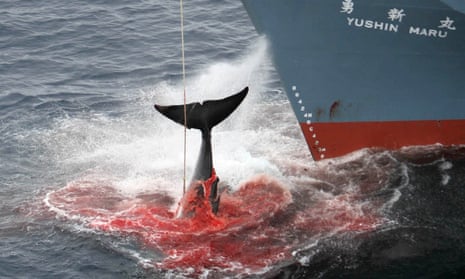Japan’s whaling fleet will set sail for the Antarctic on Tuesday despite international pressure to end its annual hunts, as Australia said it was considering sending a vessel to track the fleet in waters which Canberra considers a whale sanctuary.
The Japanese fisheries agency said the fleet would conduct “lethal research”, despite a UN court ruling last year that the hunts were a cover for commercial whaling and have no proven scientific merit. It called for the hunts to be stopped immediately.
A mother ship and three other vessels, along with 160 crew, plan to kill 333 minke whales a year in the Antarctic for the next 12 years.
Japan warned last month it would resume the controversial hunts in a note to the UN that challenged the international court of justice’s (ICJ) jurisdiction over its whaling activities.
Sea Shepherd and other anti-whaling groups have called on the Australian government, which brought the ICJ case, to put more diplomatic pressure on Japan to abandon hunting in an area of the Southern Ocean that Australia recognises as a whale sanctuary.
“We do not accept in any way, shape or form the concept of killing whales for so-called ‘scientific research,’” the Australian environment minister, Greg Hunt, said in a comment posted on his website before the announcement.
“There is no need to kill whales in the name of research. Non-lethal research techniques are the most effective and efficient method of studying all cetaceans.”
On Monday, Australia’s attorney general, George Brandis, said the government would consider sending a customs patrol vessel to the area if diplomatic efforts were unsuccessful.
A Japanese fisheries agency official said it had submitted a second revised plan to take into account the concerns and recommendations of the International Whaling Commission, which banned commercial whale slaughter in 1986 but allowed killing for scientific research. “We think all the necessary procedures are over,” the official told Agence France-Presse.
“As we seek to resume commercial whaling, it is crucial to get information as to whales’ migration, reproductive rates and the age pyramid of the population for setting catch quotas,” the official said, adding that killing the animals was the only way to obtain “essential information”.
Hunt, however, said that Japan had no right to unilaterally decide whether it had adequately addressed the IWC scientific committee’s concerns.
Until the ICJ ruling, Japan had been allowed to slaughter just under 1,000 whales a year to research their reproductive, migratory and other habits with a view to resuming sustainable commercial whaling.
A clause in the 1986 ban on commercial whaling allows Japan to sell meat from the hunts on the open market, although the public appetite for whale meat has plummeted.
Japan is in the running for a contract to build submarines for the Australian navy. The Australian Green party demanded that the Canberra government use the prospective deal to put pressure on Tokyo.
Greens senator Peter Whish-Wilson accused the Japanese of “thumbing their nose” at the Australian people, and said the Turnbull administration should issue an ultimatum: either stop the whaling fleet or lose any chance of winning the submarine contract.
This month, an Australian court found the Japanese company that organises the hunts guilty of “wilful contempt” of court for breaching an order to stop killing whales, and fined it A$1m ($720,000), in a case brought by Humane Society International.
